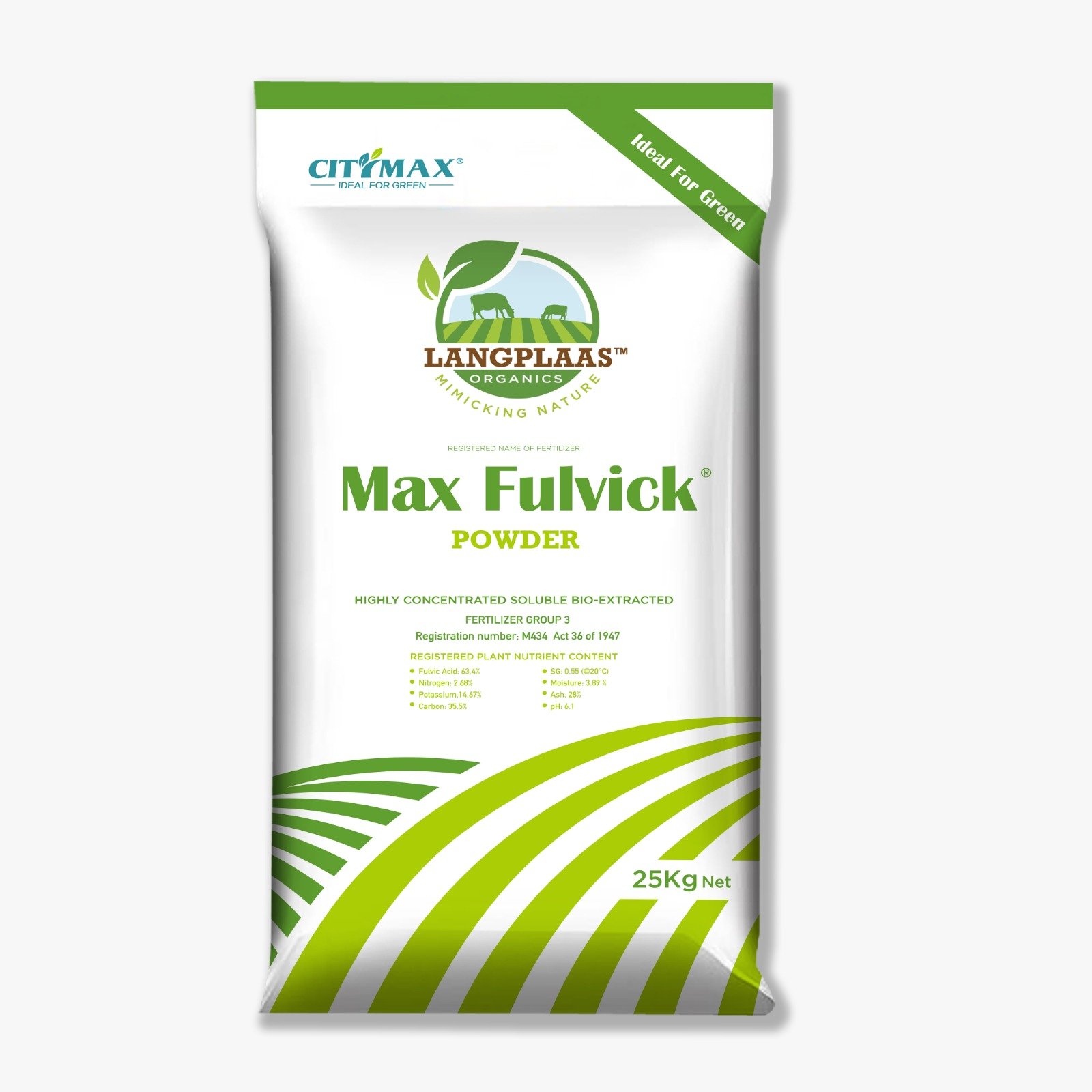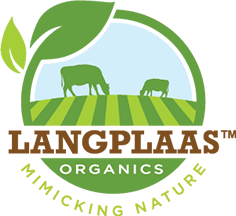 Image 1 of
Image 1 of


Max FulvicK
Langplaas Organics Max FulvicK is a high quality product of modern plant fermentation bio technology that results in absolute water solubility. It can be used profitable in almost any agricultural practice. With one of the highest CEC’s known to man, this organic acid probably is the most powerful natural chelator in the agricultural sector. Compared to an average soil, its ability to exchange cations is a breathtaking 7000% higher.
This page only gives information on quantities and pricing. If you would like to purchase any of our products please contact us here.
Langplaas Organics Max FulvicK is a high quality product of modern plant fermentation bio technology that results in absolute water solubility. It can be used profitable in almost any agricultural practice. With one of the highest CEC’s known to man, this organic acid probably is the most powerful natural chelator in the agricultural sector. Compared to an average soil, its ability to exchange cations is a breathtaking 7000% higher.
This page only gives information on quantities and pricing. If you would like to purchase any of our products please contact us here.
Langplaas Organics Max FulvicK is a high quality product of modern plant fermentation bio technology that results in absolute water solubility. It can be used profitable in almost any agricultural practice. With one of the highest CEC’s known to man, this organic acid probably is the most powerful natural chelator in the agricultural sector. Compared to an average soil, its ability to exchange cations is a breathtaking 7000% higher.
This page only gives information on quantities and pricing. If you would like to purchase any of our products please contact us here.
-
Langplaas Organics Fulvic Acid is a high quality product of modern plant fermentation bio technology that results in absolute water solubility. It can be used profitable in almost any agricultural practice. With one of the highest CEC’s known to man, this organic acid probably is the most powerful natural chelator in the agricultural sector. Compared to an average soil, its ability to exchange cations is a breathtaking 7000% higher.
Fulvic acid has a phenomenal nutrient-loading capacity related to a CEC of 1400. Due to its very small molecular size, minerals chelated with fulvic acid enjoy rapid entry through plant walls. This characteristic has tremendous importance for fast-tracking the plant availability of macro & micro nutrients. As a powerful electrolyte and bio-stimulant Fulvic acid is able to balance and energize plant cells for optimal cell division, elongation and growth.
This beautiful chocolaty brown powder from Langplaas Organics magnifies root growth and health for obvious benefits to all crops. As a bio available carbon molecule it boost’s beneficial soil microbes in the rhizosphere causing vibrant and healthy plants. Because of the high CECit increases the water holding capacity and prevents the leaching of valuable plant minerals.It is also known to detoxify pollutants in the soil, absorb poisons and catalyse the rapid breakdown of toxins.
Fulvic acid improves mineral density and as a result enhances the brix levels in the plant. It increases stomata opening and improves moisture storage to minimize the effects of drought. This phenomenal organic molecule directly influences numerous enzymatic processes to improve plant immunity and vitality.Adding Fulvic acid to livestock feed increases the nutrient uptake and boost’s gut flora resulting in excellent animal performance. As an electrolyte Fulvic acid assists the maintaining of cellular balance and optimum digestive health.
-
APPLICATION
• Foliar: 500g-5kg/ha
• Fertigation: 5-10% of total fertilizer
• Feed: Add 7% to ration every seventh day.
-
Almonds, Aloes, Apples, Apricots, Asparagus, Avocados, Bananas, Barley, Beans, Beets, Boysenberries, Brassica, Broccoli, Brussels sprout, Cabbages, Canola, Carnations, Carrots, Cauliflower, Celery, Cereals, Cherries, Chillies, Chinese cabbage, Chives, Citrus, Clover pastures, Coffee, Cole crops, Conifers, Cotton, Cruciferae, Cucumbers, Cucurbits, Cut flowers, Deciduous fruit, Dry Beans, Eggplants, Field crops, Field Vegetables, Flowering plants, Flowering seedlings, Flowers, Fodder crops, Forestry, Forestry seedlings, Fruit Trees, Fruiting plants, Gardens, Garlic, Gladioli, Golf courses, Grain Crops, Grain sorghum, Granadillas, Grapevines (winter rainfall area), Grapes, Grapevines, Grass, Grazing, Green beans, Green peppers, Groundnuts, Guavas, Horticulture, Household pests, Hydroponic solutions, Kidney beans, Lawns, Leaf crops, Legumes, Lettuce, Litchis, Lucerne, Lupins, Macadamias, Maize, Mangoes, Melons, Mushrooms, Nectarines, Tree Nut, Ground Nuts, Oats, Olives, Onions, Orchards, Oriental tobacco, Ornamentals, Papayas, Paprika, Parsley, Parsnip, Pastures, Peaches, Peaches (Western Cape only), Pears, Peas, Pecans, Peppers, Pineapples, Plums, Plums (Western Cape only), Pome fruit, Pomegranates, Potatoes, Pumpkins, Quinces, Radish, Roses, Row crops, Rye, Seedbeds, Seedling Trays, Seedlings, Shrubs, Small grain, Sorghum, Soybeans, Spinach, Squash, Stone fruit, Strawberries, Subtropical fruit, Sugar beet, Sugarcane, Sugarcane (ratoon), Sunflowers, Sweet potatoes, Sweetcorn, Table grapes, Tea, Tobacco, Tomatoes, Tree nuts, Trees, Turf, Turnip, vegetable seedlings, Vegetables, Vines, Watermelons, Wheat, Wine grapes, Youngberries
